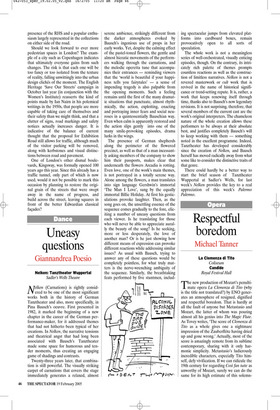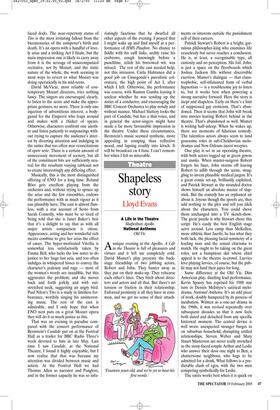Respectful boredom
Michael Tanner
La Clemenza di Tito Coliseum Candide Royal Festival Hall The new production of Mozart’s penultimate opera La Clemenza di Tito (why is the title not translated?) by ENO generates an atmosphere of resigned, dignified and respectful boredom. That is hardly at all the fault of anyone but Metastasio and Mozart, the latter of whom was pouring almost all his genius into The Magic Flute. As Tovey writes, ‘The score of Clemenza di Tito as a whole gives one a nightmare impression of the Zauberfliite having dried up and gone wrong.’ Actually, most of the score is amazingly remote from its sublime contemporary, sharing with it only harmonic simplicity. Metastasio’s ludicrously incredible characters, especially Tito himself, defy vivification. If we can ridicule the 19th century for regarding Così fan tutte as unworthy of Mozart, surely we can do the same for its high estimate of this solemn faced dodo. The near-repertory status of Tito is the most irritating fallout from the bicentenaries of the composer’s birth and death. It’s an opera with a handful of lovely arias and a striking Act I finale, but the main impression one is likely to carry away from it is the acreage of unaccompanied recitative, not by Mozart, and the static nature of the whole, the work seeming in most ways to revert to what Mozart was doing operatically in his mid-teens.
David McVicar, most reliable of contemporary Mozart directors, tries nothing fancy. The singers are encouraged, clearly, to listen to the score and make the appropriate gestures, no more. There is only one injection of adventitious interest, a bodyguard for the Emperor who leaps around and makes with a thicket of spears. Otherwise, characters confront one another and listen patiently to outpourings without trying to capture the audience’s interest by diverting attention and indulging in the antics that too often mar resuscitations of opere serie. There is a certain amount of unnecessary movement of scenery, but all of the constituent bits are sufficiently neutral for the resultant varying tableaux not to create interestingly any differing effect.
Musically, this is the most distinguished offering of ENO for a long time. Roland Böer gets excellent playing from the orchestra and, without trying to spruce up the arias and the few ensembles, endows the performance with as much vigour as it can plausibly have. The cast is almost flawless, with a star account of Sesto from Sarah Connolly, who must be so tired of being told that she is Janet Baker’s heir that it’s a delight to say that as with all major artists comparison is otiose. Appearance, acting and her wonderful rich mezzo combine to give her arias the effect of oases. The hyper-motivated Vitellia is somewhat less satisfactorily taken by Emma Bell, who lacks the low notes to do justice to her huge last aria, and too often indulges in whispered hisses to convey the character’s jealousy and rage — most of the women’s words are inaudible, but this aggravates the problem; and she moves back and forth jerkily and with outstretched neck, suggesting an angry bird. Paul Nilon’s Tito is a study in limitless forbearance, worthily singing his uninteresting music. The rest of the cast is admirable, and I only hope that when ENO next puts on a great Mozart opera they will do it as much justice as this.
That was an evening in paradise compared with the concert performance of Bernstein’s Candide put on at the Festival Hall as a trailer for BBC Radio Three’s week devoted to him in late May. Last time I saw Candide, at the National Theatre, I found it highly enjoyable, but I now realise that that was because my attention was divided between music and action. At the Festival Hall we had Thomas Allen as narrator and Pangloss, and in the former capacity he was so infu riatingly facetious that he dwarfed all other aspects of the evening. I prayed that I might wake up and find myself at a performance of HMS Pinafore. No chance to fiddle with his cuff links, archly raise his eyebrows, cough knowingly before a punchline, relish his borrowed wit, was missed. The rest of the cast needed help, not this intrusion. Carla Huhtanen did a good job on Cunegonde’s parodistic coloratura, the high point of Act I, after which I left. Otherwise, the performance was coarse, with Rumon Gamba leaving it unclear whether he was sending up the antics of a conductor, and encouraging the BBC Concert Orchestra to play noisily and without nuance. Michael Slattery looks the part of Candide, but has a thin voice, and in general the actor-singers might have made a far more favourable impression in the theatre. Under these circumstances, Bernstein’s music seemed synthetic, more appealing in romping than reflective mood, and lapsing readily into kitsch. It will be broadcast on 4 June. I can’t remember when I felt so miserable.


















































 Previous page
Previous page